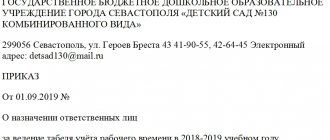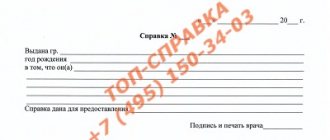Federal Law No. 402 of 06-12-11 “On Accounting” places responsibility for organizing accounting work on the head of the company. At the same time, other regulations contain the concept of managerial responsibility and chief accountant liability, even criminal liability.
What requirements does the law impose on persons responsible for maintaining accounting work in an organization, what should the chief accountant or the person performing his functions do if the requirements of the manager violate the norms and rules of accounting, who bears final and full responsibility for the violations, we will consider in the article .
Who should organize and maintain accounting work?
Based on Federal Law No. 402, in particular, Art. 7, it follows that:
- The head of the organization is responsible for organizing accounting;
- Responsibility for the practical organization of accounting work lies with the accountant or the person(s) performing his functions.
The manager can organize accounting as follows:
- form an accounting service headed by a chief accountant;
- entrust accounting to a third party;
- entrust all accounting to one person with the appropriate qualifications;
- do your own accounting.
The last two options are usually used in small and medium-sized businesses.
An employee who is responsible for accounting must meet a number of requirements. A significant part of them is related to the industry in which accounting is kept, the form of ownership, and the legal form of the company. The general requirements for the qualifications of an accounting employee are set out in the professional standard “Accountant” (Order of the Ministry of Labor No. 1061n dated 12/22/14).
So, in general, the chief accountant must have at least 7 years of work experience, of which at least 5 years must be in his specialty, engaged in accounting or auditing of organizations. If you have a higher education, the terms are 5 and 3 years, respectively.
In addition, the specified specialist must:
- generate accounting information and control its movement to the consumer without distortion;
- be able to determine the volume of accounting work, distribute it among performers, and monitor the performance of work by them;
- independently develop the accounting forms required by the organization within the framework of the law;
- generate reporting indicators based on primary accounting data;
- use modern means of transmitting reporting data and accounting services;
- know the legislation in the field of accounting and judicial practice;
- be able to analyze information;
- master information security techniques;
- have an idea of foreign experience in the accounting field, etc.
At the same time, for example, in Art. 7-4 Federal Law No. 402, contains certain requirements for the chief accountant (a person performing similar functions) responsible for accounting work in a joint-stock company, in companies participating in trading:
- higher education;
- in the absence of a specialized higher education - at least 7 years of experience, of which 5 - in accounting work;
- if you have a higher economic education, 5 and 3 years, respectively;
- absence of an outstanding criminal record in the economic sphere.
The chief accountant of a credit institution or financial institution must meet the requirements of the Central Bank. Similarly, other additional requirements may be established for the chief accountant or a person replacing him in accordance with federal legislation (Federal Law No. 402, Article 7-5).
The functions of the head of accounting organization are to prepare a legally significant package of documentation that allows regulating the work of the accounting service, purchasing and setting up equipment for the work of accountants and professional software, recruiting personnel, deciding who to entrust the accounting process to, and other administrative and economic problems.
The functions of those directly responsible for accounting (the manager himself, accountant or chief accountant, third-party organization) are as follows:
- registration of business transactions with primary documents in accordance with legal requirements;
- provision of timely information without distortion to regulatory authorities and counterparties;
- inventory of the company’s assets, taking into account timing and features, by type;
- work with counterparties, reconciliation of settlements;
- storage of documentation and reporting in accordance with established deadlines.
Who should do the accounting
All companies must maintain accounting records at all times, with the exception of representative offices (branches) of foreign organizations. Individual entrepreneurs are also exempt from accounting.
For some categories of persons it is possible to keep records using a simplified scheme. There are three categories of persons who are allowed a simplified accounting system:
- small business;
- non-profit organizations;
- organizations that have received the status of project participants to carry out research, development and commercialization of their results.
The head of the company is required to organize accounting. He may assign the responsibility for accounting to the chief accountant or an outsourcing company. In small enterprises, the duties of the chief accountant are often performed directly by the director.
Responsibility of the accountant and manager for the state of accounting
In some cases, a manager, having the appropriate qualifications and experience, can keep company records independently: if it is possible to maintain simplified accounting, or we are talking about a medium-sized business entity (Article 7-3 of Federal Law No. 402). The manager is responsible for the state of the company's accounting work.
If the work is entrusted to a single accountant with the functions of a chief accountant, or the company has an accounting staff headed by a chief accountant, he will be responsible for maintaining accounting records by law. The chief accountant is responsible for each employee of his service and for the quality of the accounting data generated by him. When hiring new employees, it is advisable to monitor the content of their employment contracts regarding the personal responsibility of performers for the quality of work.
Currently, all types of punishments, including criminal ones, can be applied to the chief accountant.
Labor Code of the Russian Federation
Contains a number of articles allowing the chief accountant to be punished (Article 81(9), 192.243), up to and including dismissal. According to Art. 243 financial liability arises in the following cases:
- the damage was caused with intent;
- due to negligence;
- under the influence of mind-altering substances;
- if a secret protected by law was disclosed, etc.
Attention! If the employment contract does not specify the conditions for the occurrence of financial liability of the chief accountant, the amount of financial liability cannot be higher than the average monthly salary (Plenum of the Supreme Court, post 52 of 16-11-06).
Code of Administrative Offenses of the Russian Federation
For gross violations in record keeping, Art. 15.11 provides for fines of 5-10 thousand rubles, and if the violation is committed after a re-check of the accounting department, the amounts increase to 10-20 thousand rubles. In addition, the chief accountant may be disqualified.
Criminal Code of the Russian Federation
Criminal liability of the chief accountant is also possible in accordance with Articles 199, 199.1 or 199.4. It occurs for malicious failure to pay obligatory payments to funds, contributions and, in the most extreme case, if it is proven by the court that abuses occurred, causing significant material damage, leads to imprisonment.
Attention! Gross violations of accounting are understood as: distortion of indicators by more than 10%, underestimation of the tax burden by the same percentage due to poor quality accounting and tax records, inclusion in primary documents of an economic event that actually did not exist, etc. ( Article 15.11 clause 2 of the Code of Administrative Offenses of the Russian Federation, note 1).
Tax liability of the organization
Not only officials, but also companies may be held liable for misstatements in accounting.
According to Art. 120 of the Tax Code of the Russian Federation, a taxpayer may be punished for violating tax accounting rules. In this case, the criteria for “rudeness” are as follows:
- Lack of documents required for accounting.
- Incorrect recording of data in accounting two (or more) times during the year.
The maximum penalty in this case is provided if accounting errors lead to tax arrears. Then the fine is 20% of the unpaid amount, but not less than 40 thousand rubles.
Separately, responsibility is provided for the reliability of the financial statements of a controlled foreign company (CFC). If an organization that is a controlling person does not provide CFC reports or submits them with distortions, then the amount of the fine will be 100 thousand rubles. ().
Fines imposed on the company, like other losses, can be recovered from the guilty parties (Article 238 of the Labor Code of the Russian Federation). But in this case, the position of the manager and the chief accountant is different.
Important!
The manager is liable for the full amount of damage caused to the company ( ).
Financial liability of the LLC director
The chief accountant, like any ordinary employee, generally bears only responsibility in the amount of the average salary (). Full financial responsibility of the chief accountant is possible if an appropriate agreement has been concluded with him, as well as in special situations, for example, if damage was caused during the commission of a crime ().
Responsibility of a third party for the state of accounting
The manager can enter into an agreement with a company that provides accounting services within the framework of his right to organize accounting (or similarly with a private person). The contract for the provision of services must be drawn up in such a way that in the event of claims regarding the quality of accounting work, responsibility can be assigned to the actual performers and their rights can be proven in court. Otherwise, the entire burden of guilt according to the law will have to be borne by the manager, as having failed to fulfill the duty properly, in accordance with Art. 7-1 Federal Law No. 402.
How to avoid mistakes in accounting and avoid criminal liability
Officials will be able to avoid sanctions if the company promptly makes changes to accounting and fully pays the required taxes, as well as fines and penalties.
However, in the case when a criminal case is opened, this is possible only once - at the first prosecution. But it is better, of course, not to bring the matter to violations and punishments at all. A smart decision by a manager is to outsource accounting to an organization that professionally manages it.
Of course, all our clients want error-free record keeping and no complaints from controllers
And we can guarantee this to them.
The dual control system allows us to ensure high quality work:
- special algorithms automatically check the correctness of accounting in general (ours invested more than 100 thousand dollars in their development);
- those nuances of accounting and tax accounting that cannot be automated are controlled by specialists responsible for this area of work, and in difficult situations internal auditors come to their aid.
Even if the inspection reveals violations due to the fault of 1C-WiseAdvice specialists, we guarantee full compensation for all financial sanctions.
Important!
1C-WiseAdvice is liable for 3 years after the submission of the last report, even if customer service has already been terminated by this time.
In addition, in many cases our experts can correct or mitigate the situation: negotiate with inspectors, write reasoned objections, and, if necessary, represent the client’s interests in court.
Who bears the greatest responsibility
In the event of unlawful demands on the part of the manager in relation to the chief accountant (the responsible person replacing him), the employee is released from liability if he was forced to commit illegal actions. This conclusion follows from the resolution of the plenum of the RF Armed Forces No. 18 dated 10/24/06. At the same time, the courts have not developed an unambiguous position on the issue of the responsibility of a particular leader on the issue we are considering. The chief accountant must keep this in mind to avoid conflict with the law.
Areas of responsibility of the General Director and Chief Accountant
Article 7 of Law No. 402-FZ establishes the responsibility of the manager for organizing accounting. Sometimes the director (in a small and medium-sized business) can keep records independently.
There are situations when a manager is obliged to hire a chief accountant or enter into an agreement for the provision of accounting services. This, in particular, applies to JSCs, banks, insurers, investment and non-state pension funds. The law even establishes requirements for the chief accountant: education, work experience, and the absence of an unexpunged or unexpunged criminal record. But the duties and responsibilities of the chief accountant are not directly mentioned anywhere in Law No. 402-FZ.
The fact that the director and the chief accountant together should still be responsible for the state of accounting is indirectly evidenced by clause 8 of Art. 7 of Law No. 402-FZ. It describes a situation when the manager and the accountant do not agree on the reflection of transactions in accounting. Then the director certifies the controversial operation with his signature and after that bears sole responsibility for it.
From this provision of the law we can conclude that the case when only the director is responsible for accounting is still an exception. In normal situations, when there are no disagreements between the top officials of the company, they are both responsible for accounting.
The division of powers between the director and the chief accountant is stated in paragraph 24 of the Supreme Court of the Russian Federation dated October 24, 2006 No. 18. The judges there indicate that the director is responsible for the proper organization of accounting, and the chief accountant is responsible for its direct maintenance, as well as the timely submission of complete and reliable accounting statements.
True, it must be borne in mind that Resolution No. 18 was adopted before Law No. 402-FZ came into force. It is focused on the norms of the previous “accounting” law No. 129-FZ of November 21, 1996, which defined the scope of activity of the chief accountant much more specifically.
So, the issue of sharing responsibility for accounting has not been fully resolved today. The procedure for applying sanctions depends on the specific situation, as well as on the area of legislation that establishes the punishment.
More details
Main
- Responsibility for organizing the company's accounting lies with its director.
- The manager either assumes responsibility for maintaining accounting records or uses the services of an accountant (chief accountant at the head of the accounting department).
- In addition, third parties may be involved in accounting work.
- The qualifications of accounting workers are determined by the current professional standards and legislative acts of the Russian Federation.
- Responsibility for incorrect accounting: from a fine and reprimand to imprisonment for gross violations in its management.
Basic documents
The main document that determines the accounting procedure is the accounting policy. It is in it that all the features of accounting are prescribed.
The accounting policy is accompanied by a working chart of accounts, which is also necessary for maintaining reliable records.
All transactions are recorded in accounting on the basis of primary documents (invoices, acts, invoices, etc.).
Based on accounting data, an accountant can create various registers, balance sheets, etc.
Who is required to keep accounting records?
There are a number of business entities for which simpler accounting schemes have been defined. This:
- small businesses. According to Law No. 209-FZ, small companies are considered to be companies up to 100 people in size with a turnover of up to 400 million rubles over the past year. Also, the share of participation in them by government agencies or other commercial companies that are not small does not exceed 25%;
- microenterprises. These are organizations of up to 14 people with a turnover of up to 60 million rubles. The share of participation of other legal entities, including state-owned companies, also does not exceed 25% (similar to the rules for small enterprises);
- non-profit organizations;
- participants of the Skolkovo project.
This ends the categories of companies that can conduct accounting according to a simplified scheme. Let's dwell a little on what is this simplified diagram? Where is it written exactly how to simplify accounting for “kids”? Here we turn to Information of the Ministry of Finance of the Russian Federation No. PZ-3/2012. It is in this document that it is described in detail what ways there are to reduce accounting schemes. For example, it says that with simplification, organizations are given the opportunity to:
- submit financial statements using simplified forms;
- maintain accounting without using double entry;
- reduce the Chart of Accounts at your discretion and not use a number of accounts;
- use the cash method of accounting for income and expenses;
- do not conduct regular revaluation of fixed assets and intangible assets;
- simplify the system of accounting registers or not use them at all (in some cases);
- correct any errors in accounting as insignificant.
The information from the Ministry of Finance is not a regulatory document - that is, it does not establish any standards, but it conveys to taxpayers the position of the country's main financial department - and this, of course, is very important.
Let us note one more important aspect. Federal Law No. 402 not only gives someone the right to conduct simple accounting and not only exempts individual entrepreneurs and branches of foreign companies from maintaining it completely, but also prohibits a number of entities from maintaining accounting according to a simplified scheme. Such organizations are listed in paragraph 5 of Article 6 of Law 402-FZ, and this list is closed. According to this norm, accounting is required to be maintained by: housing cooperatives, microfinance organizations, bar and notary chambers, government organizations, political parties and some other categories. By the way, any companies that are subject to mandatory audit cannot apply simplified accounting schemes (for example, JSCs, self-regulatory organizations, securities market participants - a complete list of them is established by Federal Law of December 30, 2008 N 307-FZ “On Auditing Activities”).
Who is responsible for accounting if the process is transferred to a specialized company?
In accordance with current legislation, service organizations cannot pay fines for companies that order accounting services from them. But the customer can ensure compensation for losses by providing a corresponding clause in the contract for accounting services. The contract must stipulate the contractor's responsibility for performing a number of operations, and then if problems arise with the tax service, the entrepreneur will have grounds to file claims with the service company.
With full accounting outsourcing, the contractor will be responsible for:
- presence of errors in reporting;
- failure to comply with deadlines for preparing and submitting accounting documentation to regulatory agencies;
- unreliable reflection of the facts of economic life.
Regardless of who keeps the accounting records in the organization, in accordance with the provisions of Law No. 402-FZ “On Accounting”, Regulations on Accounting in the Russian Federation No. 34n dated July 29, 1998 and the Tax Code of the Russian Federation (Chapter 15), its management will have to be responsible for:
- illegality of economic activity;
- failure to fulfill obligations to the state budget to pay taxes;
- loss of accounting documentation.






